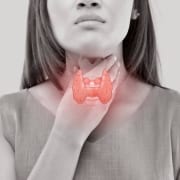Thyroid Disorders
Thyroid disorders occur when the thyroid, a gland located in the neck that helps regulate metabolism and maintain a proper hormone balance throughout the body, malfunctions. Because the  thyroid influences nearly every system in the body, even subtle imbalances can have a significant impact on energy levels, overall health, and longevity.
thyroid influences nearly every system in the body, even subtle imbalances can have a significant impact on energy levels, overall health, and longevity.
The thyroid makes two hormones, triiodothyronine (T3) and thyroxine (T4), which circulate in the bloodstream. Production of these hormones is regulated by thyroid-stimulating hormone (TSH), which is secreted by the pituitary gland, located in the brain. From the pituitary gland, TSH travels to the thyroid where it stimulates the production of T3 and T4 and their release into the bloodstream.
If your thyroid is under-active, there will be too little thyroid hormone in your bloodstream, a condition known as hypothyroidism. Symptoms may include weight gain, fatigue, constipation, hair loss, and sensitivity to cold temperatures, among others. To read more about hypothyroidism, click here.
Hyperthyroidism—too much thyroid hormone—can lead to weight loss, fatigue, muscle weakness, anxiety, bulging eyes, an elevated heart rate, and increased sensitivity to heat.
Causes of Thyroid Disorders
Usually hyperthyroidism and hypothyroidism develop as the result of an autoimmune disease. Graves’ disease is the most common cause of autoimmune hyperthyroidism. Hashimoto’s disease is the most common cause of autoimmune hypothyroidism. Depending on the type of thyroid disorder you have, other causes or risk factors include a family history of thyroid disease, iodine deficiency, medications, pregnancy, and other chronic health conditions.
A Functional Medicine Approach to Diagnosis & Treatment
The first goal in treating any thyroid disorder is to make sure that you receive an accurate diagnosis. Thyroid disorders can be difficult to diagnose because their symptoms overlap with those of many other conditions such as fibromyalgia, chronic fatigue syndrome, and Celiac disease.
Our Functional Medicine approach involves a thorough thyroid panel as well as antibody testing, digestive tests, vitamin & mineral testing, and adrenal testing to evaluate the overall health of your thyroid and uncover imbalances and deficiencies that may exist.
After reviewing all of the factors contributing to your condition, your physician will spend time talking with you about your diagnosis and working with you to create an integrative treatment plan that addresses not only your immediate pain but also any possible underlying or co-existing conditions that may be causing or aggravating your symptoms.
Integrative therapies for treating thyroid disorders include:
- Natural & Synthetic Hormone Replacement Therapy (HRT)
- Acupuncture
- Prescription Medications
- Herbal Remedies
- Nutritional Counseling/Supplementation
- Sleep Evaluation & Management
- Yoga/Meditation
If you have been diagnosed with a thyroid disorder or are experiencing symptoms and would like to discuss your condition with a physician, contact us today.
We are here for you, and we want to help.
Our goal is to return you to optimal health as soon as possible. To schedule an appointment please call: 703-532-4892 x2




